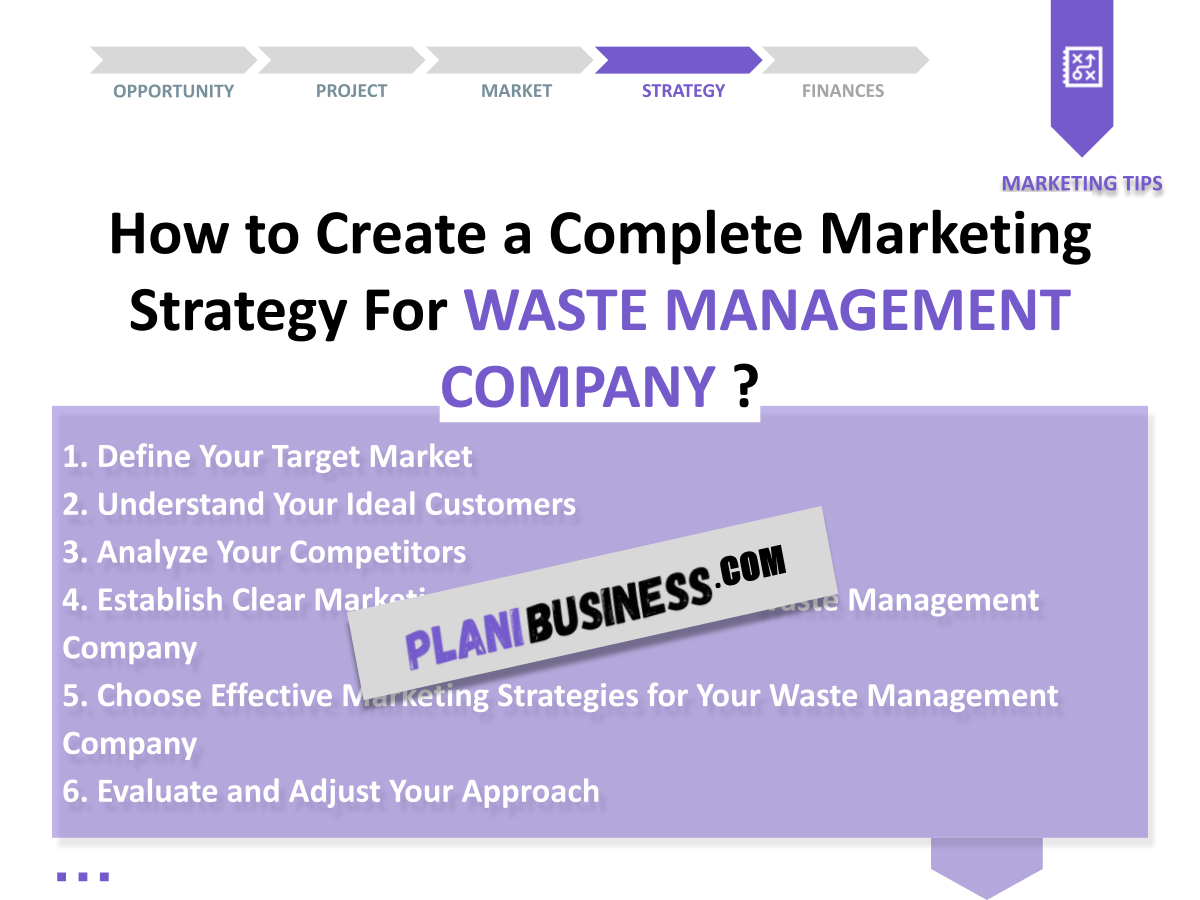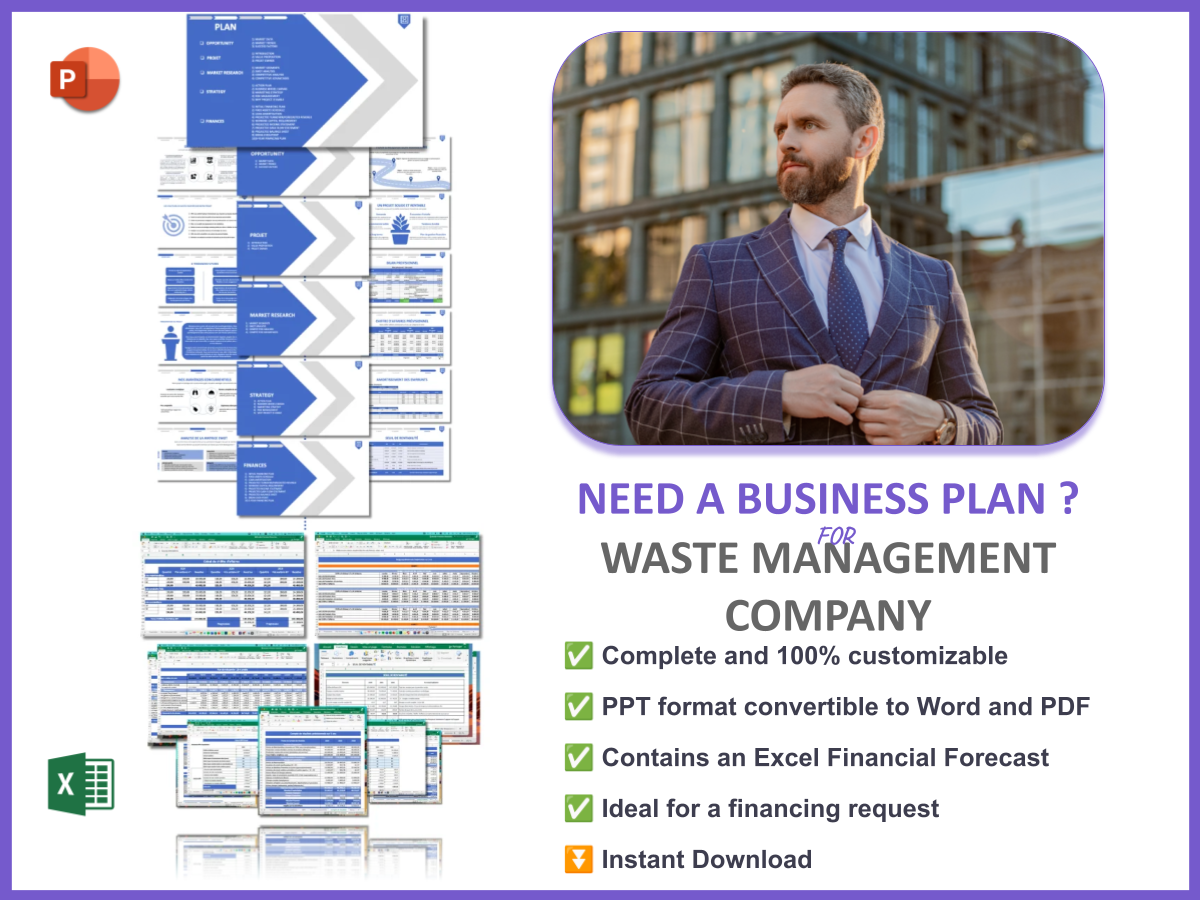Waste Management Company Marketing Plan is crucial for any business looking to thrive in today’s competitive landscape. Did you know that waste management is a multi-billion dollar industry, yet many companies struggle to effectively market their services? This article will guide you through the steps of creating a comprehensive marketing plan tailored for waste management companies. You’ll learn how to identify your target market, understand your customers, analyze competitors, and set clear marketing objectives.
1. Define Your Target Market
| Aspect | Details |
|---|---|
| Demographics | Age, income, location, etc. |
| Industry | Residential, commercial, industrial, etc. |
Understanding your target market is the first step in your Waste Management Company Marketing Plan. It helps you tailor your services and messaging to meet their specific needs. Here are some key aspects to consider when defining your target market:
- Demographics: Identify age groups, income levels, and locations that are most likely to require waste management services.
- Industry Segments: Determine whether you will focus on residential, commercial, or industrial waste management.
- Psychographics: Understand the values and lifestyles of your potential customers, which can guide your marketing messages.
By narrowing down your target market, you can create more effective marketing campaigns that resonate with your audience. This will not only enhance your outreach but also improve conversion rates.
2. Understand Your Ideal Customers
| Customer Type | Characteristics |
|---|---|
| Homeowners | Looking for reliable residential waste disposal |
| Businesses | Require regular waste pickup and recycling |
Identifying your ideal customers will help you focus your marketing efforts. Here are some steps to take:
- Create Customer Personas: Develop detailed profiles that represent your ideal customers. Include their age, occupation, interests, and waste management needs.
- Survey Existing Customers: Gather feedback from current clients to better understand their preferences and pain points.
- Analyze Buying Behavior: Look at what services are most popular and why customers choose your company over competitors.
By having a clear picture of your ideal customers, you can tailor your marketing strategies to appeal directly to them, making your outreach efforts more effective and personalized.
3. Analyze Your Competitors
| Competitor | Strengths | Weaknesses |
|---|---|---|
| Company A | Excellent customer service | Higher pricing |
| Company B | Lower pricing | Poor online presence |
Analyzing competitors can reveal opportunities and threats in your market. Here’s how to conduct a thorough competitor analysis:
- Identify Key Competitors: Make a list of local waste management companies that offer similar services.
- Evaluate Their Strengths: What do they do well? This could include customer service, pricing, or innovative services.
- Assess Their Weaknesses: Look for gaps in their offerings. Are they missing out on digital marketing? Are their services limited?
By understanding what your competitors are doing, you can find ways to differentiate your services. Whether it’s through better pricing, enhanced customer service, or unique offerings, you can carve out a niche that appeals to your target market.
4. Establish Clear Marketing Objectives for Your Waste Management Company
| Objective | Metric |
|---|---|
| Increase brand awareness | Achieve a 30% increase in social media followers |
| Boost customer retention | Improve retention rate by 20% |
Setting clear, measurable objectives is essential for tracking progress in your Waste Management Company Marketing Plan. Here are some key marketing objectives to consider:
- Brand Awareness: Aim for a specific percentage increase in brand recognition within your target market.
- Customer Acquisition: Set goals for the number of new customers you want to attract each quarter.
- Customer Retention: Focus on retaining existing customers by enhancing service quality and communication.
- Lead Generation: Establish a target for leads generated through online and offline marketing efforts.
By having clear marketing objectives, you can create focused strategies that align with your business goals. This not only helps in measuring success but also guides your team in executing the Waste Management Company Marketing Plan effectively.
5. Choose Effective Marketing Strategies for Your Waste Management Company
| Strategy | Description |
|---|---|
| Content Marketing | Create informative blog posts about waste management |
| Social Media Marketing | Engage with customers on platforms like Facebook and Instagram |
Choosing the right strategies can make or break your marketing efforts. Here are some effective marketing strategies for your Waste Management Company Marketing Plan:
- Content Marketing: Develop valuable content that educates your audience about waste management practices, recycling tips, and environmental issues. This will position you as an authority in the field.
- Social Media Marketing: Use platforms like Facebook, Instagram, and LinkedIn to engage with your audience. Share success stories, tips, and industry news to build a community around your brand.
- Email Marketing: Create targeted email campaigns to keep your customers informed about services, promotions, and tips for waste management.
- Local SEO: Optimize your website for local searches to ensure that potential customers can find you easily. This includes using local keywords and claiming your Google My Business listing.
By implementing a mix of these strategies, you can effectively reach and engage your target audience, driving more leads and conversions for your waste management services.
6. Evaluate and Adjust Your Approach
| Evaluation Method | Frequency |
|---|---|
| Customer Feedback | Quarterly |
| Sales Metrics | Monthly |
Regularly evaluating your marketing efforts will help you understand what’s working and what’s not. Here’s how to effectively evaluate and adjust your Waste Management Company Marketing Plan:
- Collect Customer Feedback: Use surveys and feedback forms to gather insights from your customers about their experience with your services.
- Monitor Sales Metrics: Track sales data to see which marketing strategies are driving the most conversions. Look for patterns and adjust your approach accordingly.
- Analyze Website Traffic: Use tools like Google Analytics to see how visitors are interacting with your website. Are they finding the information they need?
- Review Social Media Engagement: Assess how well your social media posts are performing. Which types of content are resonating with your audience?
By continuously evaluating your marketing strategies, you can make informed decisions that enhance your approach and improve overall effectiveness. Flexibility and responsiveness to data are key to a successful Waste Management Company Marketing Plan.
7. Example N°1 of Marketing Plan for a Residential Waste Management Company
| Steps | Actions | Details |
|---|---|---|
| 1 | Target Market | Focus on suburban neighborhoods |
| 2 | Ideal Customers | Homeowners aged 30-50 |
| 3 | Competitors | Analyze local waste services |
| 4 | Marketing Objectives | Increase customer base by 25% |
| 5 | Marketing Strategies | Use local SEO and social media ads |
| 6 | Evaluation | Track monthly growth |
This example illustrates a marketing plan for a residential waste management company aiming to grow its customer base. The focus is on suburban neighborhoods where homeowners are more likely to require regular waste disposal services. By analyzing local competitors and setting clear marketing objectives, this company can implement effective strategies like local SEO and targeted social media ads to reach potential clients.
8. Example N°2 of Marketing Plan for a Commercial Waste Management Company
| Steps | Actions | Details |
|---|---|---|
| 1 | Target Market | Focus on local businesses |
| 2 | Ideal Customers | Restaurants and retail stores |
| 3 | Competitors | Review pricing models |
| 4 | Marketing Objectives | Grow partnerships by 15% |
| 5 | Marketing Strategies | Networking events and B2B marketing |
| 6 | Evaluation | Measure success through client feedback |
This example highlights a marketing plan for a commercial waste management company targeting local businesses, such as restaurants and retail stores. By focusing on building partnerships and evaluating pricing models of competitors, this company can implement strategies like attending networking events and engaging in B2B marketing to enhance its outreach. Regularly measuring success through client feedback will ensure that the marketing plan remains effective and adaptable to the changing market.
9. Example N°3 of Marketing Plan for a Recycling Waste Management Company
| Steps | Actions | Details |
|---|---|---|
| 1 | Target Market | Focus on environmentally conscious consumers |
| 2 | Ideal Customers | Eco-friendly businesses and households |
| 3 | Competitors | Analyze green initiatives of competitors |
| 4 | Marketing Objectives | Increase awareness of recycling services by 40% |
| 5 | Marketing Strategies | Host community recycling drives |
| 6 | Evaluation | Assess participation rates |
This example presents a marketing plan for a recycling waste management company aiming to attract environmentally conscious consumers. By focusing on eco-friendly businesses and households, the company can leverage its strengths in sustainability. Setting a goal to increase awareness of recycling services by 40% allows for targeted marketing strategies such as hosting community recycling drives and educational workshops. Evaluating participation rates will provide insights into the effectiveness of these initiatives and help refine future campaigns.
10. Example N°4 of Marketing Plan for a Hazardous Waste Management Company
| Steps | Actions | Details |
|---|---|---|
| 1 | Target Market | Focus on industries dealing with hazardous materials |
| 2 | Ideal Customers | Manufacturing and chemical plants |
| 3 | Competitors | Evaluate compliance and safety records |
| 4 | Marketing Objectives | Enhance safety compliance by 50% |
| 5 | Marketing Strategies | Webinars on hazardous waste management |
| 6 | Evaluation | Track compliance improvements |
This example outlines a marketing plan for a hazardous waste management company that focuses on serving industries that deal with hazardous materials, such as manufacturing and chemical plants. By enhancing safety compliance by 50%, the company can position itself as a trusted partner in managing hazardous waste. Strategies like hosting webinars on best practices for hazardous waste management can educate potential clients while showcasing expertise. Regularly tracking compliance improvements will help in assessing the effectiveness of the marketing efforts and refining the approach as needed.
11. Example N°5 of Marketing Plan for a Construction Waste Management Company
| Steps | Actions | Details |
|---|---|---|
| 1 | Target Market | Focus on contractors and builders |
| 2 | Ideal Customers | Construction companies |
| 3 | Competitors | Assess service offerings |
| 4 | Marketing Objectives | Increase contractor partnerships by 30% |
| 5 | Marketing Strategies | Direct outreach and referrals |
| 6 | Evaluation | Review partnership growth |
This example illustrates a marketing plan for a construction waste management company targeting contractors and builders. By focusing on construction companies, the company can establish partnerships that are essential for providing timely waste disposal services on job sites. Setting a goal to increase contractor partnerships by 30% can be achieved through direct outreach, networking events, and leveraging referrals from satisfied clients. Regularly reviewing partnership growth will help the company identify effective strategies and areas for improvement in their marketing efforts.
12. Example N°6 of Marketing Plan for a Municipal Waste Management Company
| Steps | Actions | Details |
|---|---|---|
| 1 | Target Market | Focus on local governments |
| 2 | Ideal Customers | City councils |
| 3 | Competitors | Study city contracts |
| 4 | Marketing Objectives | Secure 10 new municipal contracts |
| 5 | Marketing Strategies | Attend city council meetings |
| 6 | Evaluation | Monitor contract bids |
This example details a marketing plan for a municipal waste management company aiming to secure contracts with local governments. By focusing on city councils, the company can establish itself as a reliable partner for public waste management services. The goal to secure 10 new municipal contracts can be pursued by attending city council meetings and building relationships with decision-makers. Monitoring contract bids will help the company stay informed about opportunities and refine its approach to meet the specific needs of municipalities.
13. Example N°7 of Marketing Plan for a Recycling Center
| Steps | Actions | Details |
|---|---|---|
| 1 | Target Market | Focus on environmentally conscious consumers |
| 2 | Ideal Customers | Local residents and businesses |
| 3 | Competitors | Analyze local recycling programs |
| 4 | Marketing Objectives | Increase foot traffic by 50% |
| 5 | Marketing Strategies | Community events and workshops |
| 6 | Evaluation | Assess participation in events |
This example outlines a marketing plan for a recycling center that targets environmentally conscious consumers, including local residents and businesses. To increase foot traffic by 50%, the recycling center can organize community events and educational workshops about the importance of recycling and waste reduction. Analyzing local recycling programs will help identify gaps in services and areas for collaboration. Regularly assessing participation in events will provide valuable feedback on community engagement and inform future marketing efforts.
Conclusion
Creating a comprehensive Waste Management Company Marketing Plan is essential for success in the competitive waste management industry. By defining your target market, understanding your ideal customers, analyzing competitors, and establishing clear marketing objectives, you can effectively reach and engage your audience. Don’t forget to continuously evaluate and adjust your strategies to ensure they remain effective.
For those looking to build a solid foundation for their business, I highly recommend checking out this business plan template for a Waste Management Company. It will provide you with a structured approach to developing your business.
Additionally, if you’re interested in more insights, be sure to read our articles on How to Develop a Waste Management Company? and how to create a SWOT analysis for Waste Management Company. These resources will help you navigate the complexities of the waste management industry and set you up for success.
FAQ
- What is a waste management company?
A waste management company provides services related to the collection, disposal, and recycling of waste materials. They play a crucial role in maintaining public health and environmental safety. - How do I start a waste management business?
To start a waste management business, you need to develop a solid business plan, obtain necessary permits and licenses, and establish a marketing strategy to attract customers. - What are the types of waste management services?
Common types of waste management services include residential waste collection, commercial waste disposal, recycling services, hazardous waste management, and construction waste management. - How can I market my waste management company?
You can market your waste management company through various strategies such as local SEO, social media marketing, content marketing, and community engagement events. - What are the key challenges in waste management?
Key challenges include regulatory compliance, public awareness, competition, and the need for sustainable practices in waste disposal and recycling. - How do I find customers for my waste management services?
Finding customers can involve networking with local businesses, advertising your services online, and participating in community events to raise awareness about your offerings. - What is the importance of recycling in waste management?
Recycling reduces the amount of waste sent to landfills, conserves natural resources, and lowers greenhouse gas emissions, making it a vital aspect of waste management. - How do I set competitive pricing for my waste management services?
Research local competitors, analyze service costs, and consider your operational expenses to set competitive pricing that also reflects the value you provide. - What are the benefits of having a waste management plan?
A waste management plan helps organizations manage waste effectively, reduce costs, comply with regulations, and minimize environmental impact. - How do I evaluate the success of my waste management marketing plan?
Evaluate success through metrics such as customer acquisition rates, feedback from clients, and overall growth in revenue and market share.







